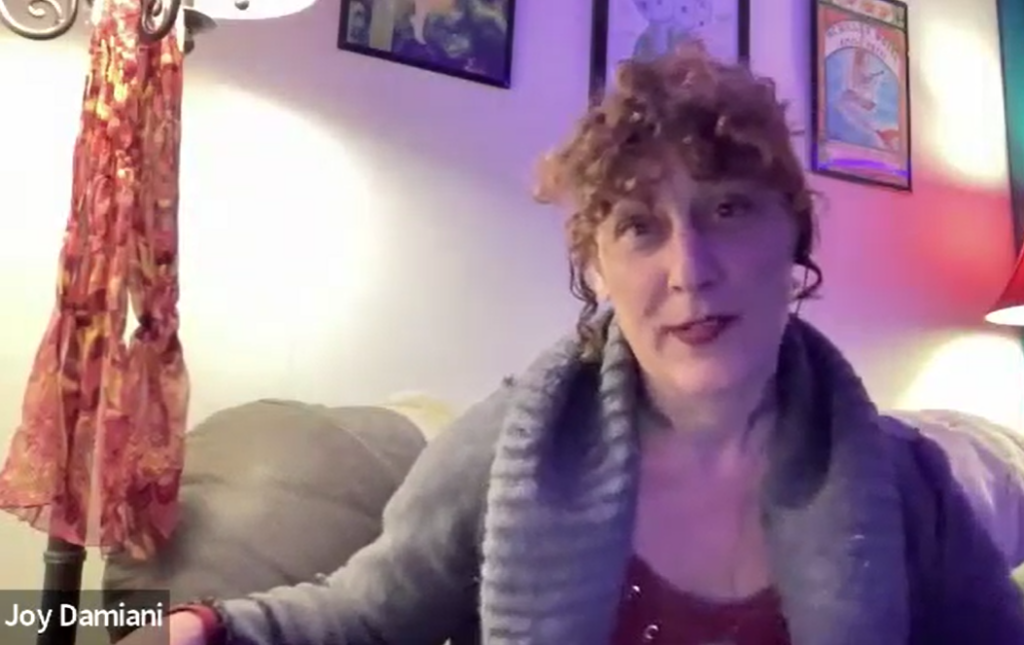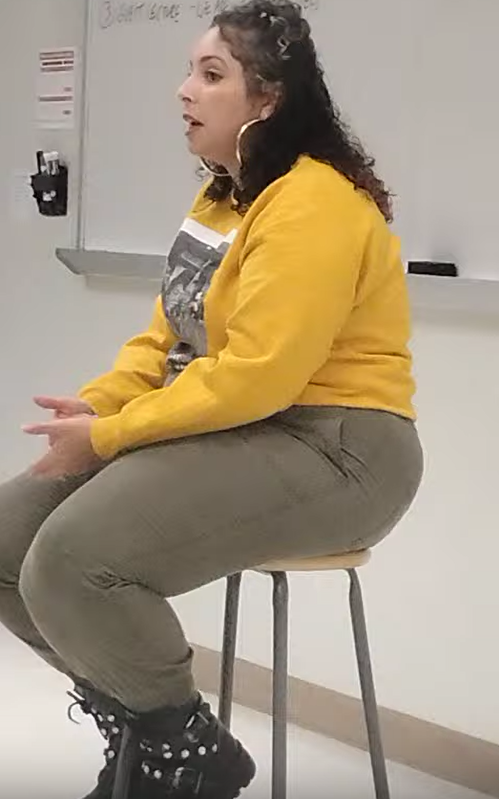
Brian Teucke speaking with students
A thought from Debra Sweet:
In the fall of 1969, I crammed into a room with other students to hear an anti-war journalist speak about Vietnam. I had already protested to stop that war, and I “knew” it was bad. But hearing someone who had been in Vietnam covering the Tet Offensive was decisive in making me a firm opponent of that war and many other U.S. wars since.
Do people change their views by talking with others? Does it do any good to tell war stories? Only if you’re telling truth in a time where lies are the currency. After speaking in hundreds of schools, to many thousands of students over 16 years, we have evidence that we affect how they see the U.S. military.
JUST IN: A very generous donor has pledged to match all donations to World Can’t Wait, up to $2,000. >> Your gift will be doubled now.
November saw We Are Not Your Soldiers presenting at 10 different schools involving many classes and groups of students, mostly in New York City but going by Zoom to other states and one other country!
We began at a community college here in NYC where Joe Urgo spoke to two classes. Shaniyat Turani-Chowdhury spoke to a third class. We received this message from the professor:
“Thank you to We Are Not Your Soldiers. It was such a privilege to have you, Joe and Shaniyat come to our school this semester. I know the students got a lot out of the experience. For some, I expect it will be one of the most meaningful moments of their semester.
Joe, I know that a lot of my students really appreciated your frank storytelling about your time in the military, and your critical discussion of the actual motivations behind so many of the U.S. military interventions of the past 50 years. We all valued your direct style and your insistence that we consider the moral questions underlying U.S. wars.
Shaniyat, In the debrief conversation we had some days after your presentation, students shared that they felt you gave them a dose of reality about what day to day life is actually like as a soldier. Many said that they’d previously had no idea about what was actually happening in places like Iraq and Afghanistan during the years of U.S. military intervention ? and this sparked more conversations in which the facts could be divulged and considered. One student said she was sobered by your depiction of U.S. soldiers as expendable, as pawns in a global game of power and empire-making. This resonated for a lot of students, who I suspect had not previously thought critically about the military and its ubiquitous recruitment apparatus.”
Joe then spoke to two more classes at another community college in the city. We started noticing much more concern among the students in these four classes, which continued throughout the month, about what the future holds under a Trump presidency. Students also raised the issue of Gaza more this semester than they did last school year.
On Veterans Day, John Burns presented via Zoom to three classes in a North Carolina community college where we started off by streaming Collateral Murder. We’ve posted excerpts from a number of student papers based on the visit. Here’s one example:
When we were told that a veteran was visiting our class, I didn’t expect the presentation that we got. I expected it to be some light ‘join today’ war glorifying BS (not to discredit the professor’s taste in guest speakers). Instead, we got the authentic, real stuff. I appreciated it. War is evil, the military is evil, I hate it all, and I’m glad there was no sugarcoating. The video was horrifying. It needed to be shown, we needed to see it to understand the gruesomeness. I was quiet the whole classtime because, I mean, what can you say. I’m not sure more or less needed to be said. That was a wonderful honest presentation the way it was. I’m not sure what to do to make it easier to show a class or get students to interact more. If students can see, hear, and learn about all that and then engage in class discussion like normal, then I seriously doubt they understood the impact. I think the contents of this presentation truly struck me which made me speechless and maybe that’s the way it should be for viewers.
Next, we found ourselves zooming in to a meeting of college student activists in Ohio with a presentation by Joy Damiani for a deep discussion.

The next day took us to the first of two visits to another community college in NYC, this time with presentations by Brittany Ramos DeBarros, with more thoughtful questions. That evening Miles Megaciph presented to a student organization via Zoom once again in North Carolina. And then Brittany was off to another one of NYC’s many colleges.

Brian Teucke spoke at two different colleges in one day. The second, seen in the photo at the top of this page, an Arabic language class whose members are prime recruitment targets to become military interpreters or CIA assets. The class members were joined by activist students at the school. The professor wrote, “Thank you and Brian so much for taking the time to join us in person(!) and for such an interesting and thought-provoking conversation.”
We ended the month with two fairly unusual visits. First we zoomed in with John to a middle school where the very well-prepared students watched a clip from Unmanned which they discussed afterwards.
And then Joe and Lyle Rubin presented to a graduate class in diplomacy and security in Paris! No, we didn’t fly there, we went via remote technology. The discussion was fascinating. Here are some of the questions raised by the students:
Thank you very much once again for your intervention. When talking about dehumanization, you talked about saying out loud a sentence “one shot, one kill.” It made me think about the game, League of Legends, where some heroes are literally saying this sentence all through the playtime. I was wondering if videogames are a first step towards dehumanization.
Thank you so much for your time and for sharing your story; your testimony is incredibly impactful. You mentioned the harshness of the training within the Marines and the methods that made you more “malleable” and obedient in the field, to the point where you could confront ethical dilemmas without necessarily questioning them. Beyond that, were you specifically prepared for these ethical dilemmas before deployment? Did you receive any training or psychological preparation? Finally, similar to the “decompression period” provided to French soldiers after their overseas operations, do you have access to a psychological support program to assist with your reintegration into civilian life? And if so, in your view, is it effective?
Thank you for sharing with us, memory is very important for us. My father was in Afghanistan in 2008, he never talked much about it afterward. We talk a lot about the soldier and his trauma during the war, after the war, but never about his relatives. Could you tell us a bit, whether it’s personal or general knowledge, about the family frame of the soldier after being back from war?
Are the soldiers taught international law before going to war, like about war crimes and laws about them which concern the soldiers?
In your presentations you talked about imperialism and colonialism, so based on your knowledge of military history, do you see recurring patterns in how imperialist or colonial powers conduct war? How do these patterns inform your perspective on current global conflicts?

